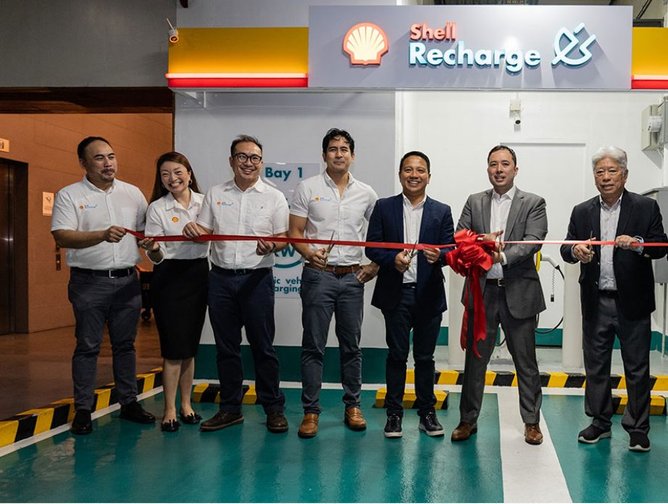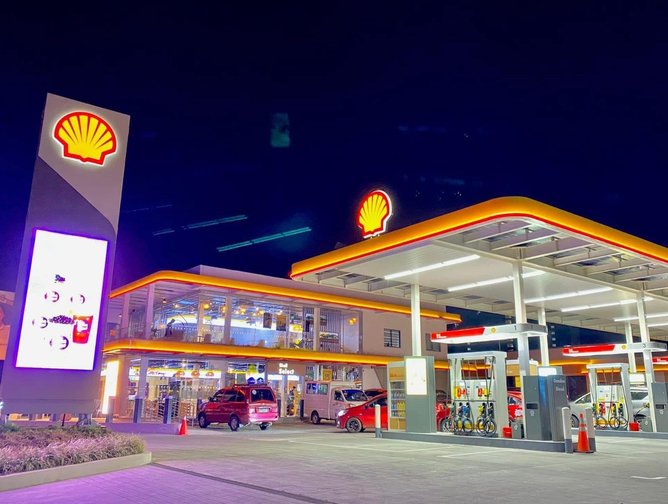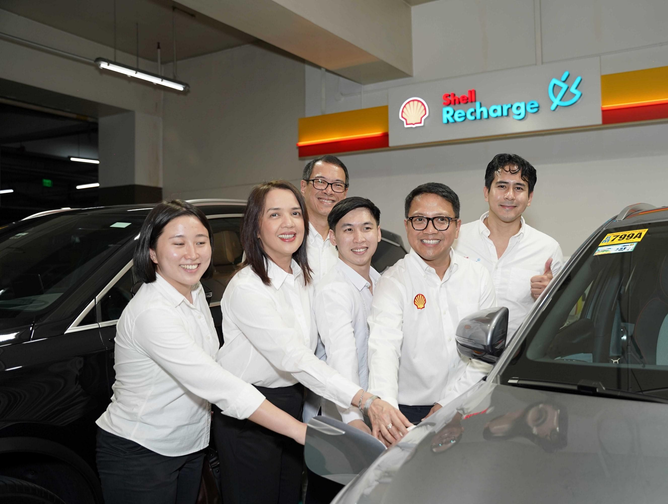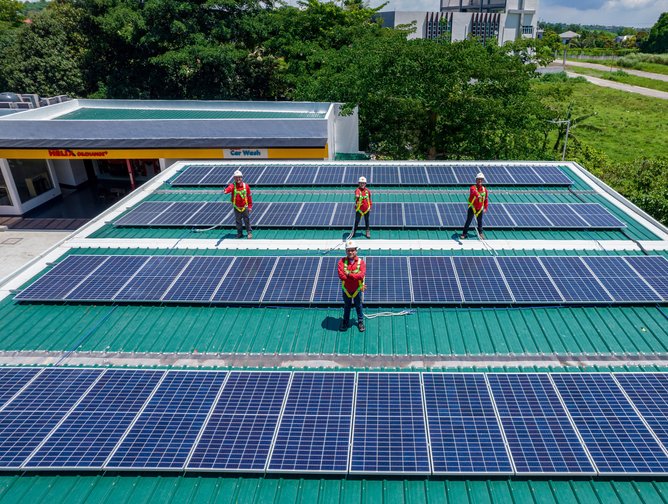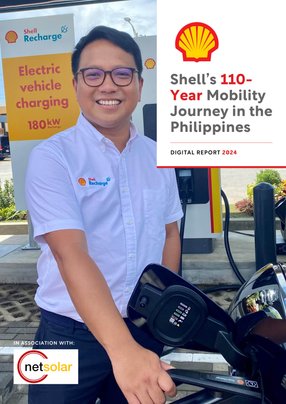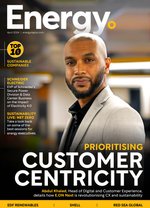Shell has been building its network in the Philippines for 110 years. From first selling kerosene, then oil and gas, in 2024 it's now EV chargers and battery swapping technology that are on offer. Across 7,000 islands, 95% of the Filipino population can reach a Shell station within 20km — a station which offers more than just fuel.
Shell provides the best quality fuel for conventional cars and chargers for electric vehicles, as well as equipment for servicing and cleaning them. As fuel for the driver, the convenience stores attached to Shell’s stations offer a variety of food and drinks options. Shell wants to help customers on their journey — whether they’re walking or cycling, driving a car or riding in one, in a truck or on a motorbike. Shell's core mission is to power the progress of the nation, by providing cleaner energy solutions.
Leadership at Shell Philippines and environmental innovation
Randy Del Valle is the General Manager for Mobility Philippines at Shell. He studied Chemical Engineering in the Philippines and later completed his MBA at London Business School. As a General Manager for the Mobility Philippines, Del Valle leads the entire ecosystem of Shell’s mobility stations across the country.
“I manage a team that serves a million customers a day,” he says. “By the way, I'm also an EV driver.”
There's a huge element of operational excellence involved in Del Valle’s work — consistency in delivery of high-quality products, services, customer experience and safety.
“We serve the communities where we operate,” says Valle. “It's quite a joy because we bring in a number of jobs. On one typical site, we employ around 30 people in one station.”
Whether in the summer capital on the mountains of Baguio or the sprawls of Quezon City, Shell creates job opportunities that elevate the community. Del Valle believes that Shell empowers progress in communities and played a crucial role during the pandemic, as mobility stations remained open, making the country come through stronger after COVID-19. Even during this time, Shell continued its low emission investments — a pursuit that has already won Shell several internal and external awards. One came from the National Association of Convenience Stores Global, which recognised Shell Philippines as one of the most innovative and sustainable companies, across Asia and the Pacific.
“That was for our mobility transformation efforts, by offering new low emission products,” says Del Valle. “Another recognition came from the Property Awards — we were the only energy company that was awarded, for our sustainable retail format.”
Shell won the Asia Corporate Excellence and Sustainability Awards, partly because of its development of new solutions for plastic waste.
Plastic bottles are a plague across the Philippines as much as the rest of the world, but it’s one of the closest countries to The Great Pacific Garbage Patch - a mass of plastic tangled in discarded fishing nets that's grown to become twice the size of Texas. Shell is working hard to contribute to solving the plastic waste problem by pursuing, recycling, upcycling and repurposing its plastic waste. In its partnerships with Green Antz, lubricant plastic bottles are collected at Shell stations and then repurposed into eco-bricks. “These eco-bricks are actually used to build our Shell sites,” Del Valle adds. “It’s a great way to promote the circular economy within the community and also make sure that we use plastic waste for sustainability reasons.”
Think of a plastic bottle and you will probably think of non-alcoholic beverage container, like Coca-Cola, which customers buy, consume and dispose of in Shell’s convenience store. The soft drink giant is aware of its plastic footprint and has set its global commitment to collect and recycle the equivalent of every bottle that sells in 2030. Coca-Cola partnered with Shell to install collection points for the bottles, reinforcing Shell's goal to develop a more efficient waste management system, particularly for the disposal of clear PET bottles sold in its stores.
“To date, we have 50 stores participating in the programme and equipped with recycling bins and materials for information, education and communication, which raises the awareness of our recyclability of clear PET bottles, while encouraging an active participation of the community,” says Del Valle.
Supporting local communities with mobility, recycling points and coffee beans
Del Valle has worked with Shell for more than 25 years and in several countries — including London, Singapore and Manila. He moved back to the Philippines in 2020.
“At the start of the pandemic, I led the mobility team. It was an opportunity to lead this business in the most difficult time, while also transforming it,” he says.
Shell has evolved massively since Del Valle joined and one thing that he’s seen transform more than any other, is Shell’s mindset amidst energy transition.
“Shell will continue to be the partner company to provide cleaner energy solutions,” says Del Valle. “But it's not just an ‘evolution’, Shell is leading the advocacy in this energy transition. Shell’s sustainable evolution is a core mission supplemented by adjacent offers and services that we give to the consumers, that's practically evolving. Before, we were just talking about ICE vehicles, but right now, there's EV vehicles and 2-3-wheeler EVs as well. I’ve seen Shell lead the way in this transition and provide offers for such customers.”
Because of Shell’s global reach, the company has been at the forefront of the energy transition and has developed new solutions for customers in the industry, making itself a part of the global conversation in the energy transition space.
“At Shell, we work with a lot of people — the government, OEMs, customers and communities. We continue the conversation around the energy transition and continue to innovate,” says Del Valle.
Whether it’s external engagement or internal alignment, Shell is a part of societal change, with its global, regional and country-level leaders serving as ambassadors for change.
“In this case, we are providing cleaner energy solutions and talking about the energy transition, while looking at how we can become a net zero company, so that we can ultimately live in a sustainable way and work towards our net zero ambition,” says Del Valle.
Shell is also supporting local communities with relevant social development programmes, as well as business partnerships and job opportunities for thousands of families.
Customer behaviours and shifting market dynamics have driven mobility transformation, as the intent to be sustainable in the long-term grows in the Philippines and across the world.
“Our transition to mobility aims to change the perception of Shell, from just a mere gas station, to making it a destination, which is what we call mobility,” says Del Valle.
Shell’s convenience store also offers a Shell Cafe, which uses local coffee beans. Shell’s digital systems, such as touchless payment option and digital loyalty app through Shell GO+, are also available.
“Our mobility stations are very customer centric hubs which meet various missions, for both fuels and non-fuels. The site format has a customer-centric design to ensure a safe and enjoyable visit,” says Del Valle. “This consideration blends in the way that we communicate the purpose of our company, which is to power the progress in the Philippines.”
Shell balances harnessing energy and caring for its environment with its Avoid, Reduce and Compensation (ARC) framework, where the Philippines will contribute to the global ambition of net zero carbon footprint by 2050.
“We’re equipping our sites with low carbon operations and low emission product solutions,” says Del Valle. “We have invested in sustainable elements into our mobility station to reduce the carbon intensity of our site operations across our Shell mobility sites.”
Sites are equipped with alternative or energy efficient equipment, such as solar panels and solar perimeter lights. For the air conditioning and freezers, inverters are used and at stations, there are a number of water harvesting facilities. The Green Wall, a self-irrigating plant, and other rainwater collectors use run-off water for the station’s plants, the wider landscape area and even for the toilet.
Charging Electric Vehicles at Shell with renewable energy
In the Philippines, 60% of its electricity comes from coal. But due to a recent partnership with the Department of Energy and Shell Energy Philippines, an entity created to produce renewable energy sources, Shell’s charging facilities are fully powered by renewable energy.
“Now, every time Shell recharges an EV, it will be powered by Shell Energy, which comes from renewables,” says Valle. “When you drive an EV and charge it at Shell, you're 100% sure that it comes from renewables. Moreover, our Ultra-fast charging facilities can charge your EV in just 25 minutes.”
Shell has also partnered with Sun Mobility to unveil a battery swap solution.
“We have onboarded third party logistics to provide a last mile mobility solution, which is another breakthrough that supports the energy transition,” he adds. “By pursuing Smarter Energy Solutions, we hope to fulfil Shell's global sustainability and social purpose ambition, to contribute to our 2050 Carbon Net Zero goal.”
Shell is reducing range anxiety for electric vehicle drivers by aligning its capital investments on electric mobility based on the demand projection and government legislation.
“To date, Shell is the only EV charging network operator with multi ultra rapid chargers in the network, connecting over 600 km of EV loop. Within 600 km, we can let the drivers go around the biggest island in the Philippines, Luzon.”
Shell has partnered with a real estate institution, Neo, Ortigas land and Robinsons land, to provide three destination charging locations that provide access to EV owners during their dwell time to this location.
“In total, we have launched Shell recharge in eight locations, with a total of 24 charging points, reducing the range anxiety of our EV drivers and safely reaching their destination. This is something that can help our customers to feel safe as they drive their EV.”
Over the next year, Shell will continue to smartly invest in transforming the rest of its sites.
“Shell's focus is to thrive amidst energy transition and the hyper competitive market environment,” says Valle. “We will work with our internal and external partners to provide quality products and services, in a competitive and sustainable way.”
This will only be possible, if Shell has the support of its partners, local communities and customers. Now more than ever before, Shell will be there to work with Filipino society in line with the energy transition that is already of great interest to its customers.
**************
Make sure you check out the latest edition of Energy Digital Magazine and also sign up to our global conference series - Sustainability LIVE 2024
**************
Energy Digital is a BizClik brand
